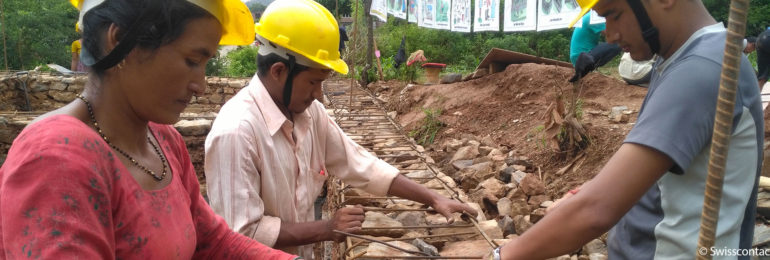


Three years after a major earthquake shook Nepal in 2015, Swiss Solidarity, together with its partners, committed to turning those affected by the disaster into stakeholders in the reconstruction process. Specifically, the foundation backed the development of an innovative app used to monitor housing construction in real time. In three years, 1,760 homes and 13 schools were rebuilt, and 26 villages have access to drinking water again.
Swiss Solidarity is a key backer of an approach which encourages beneficiaries to play an active role in the humanitarian aid they receive. In keeping with government policy, SwS recommends that rebuilding efforts be managed jointly with those directly affected by disasters. All of foundation’s partner NGOs are committed to the idea that beneficiaries must be heard and become stakeholders in the aid they receive.
Swiss Solidarity conducted a joint study with its 10 Swiss partners active in Nepal to ensure that the people they support are playing a role in reconstruction projects and being kept informed about the rebuilding efforts. This was achieved by creating user committees, publishing explanatory posters, installing suggestion boxes, and using social media, radio and television, to name but a few.
“People need to be heard. Always. They are better placed than we, the humanitarian workers, to decide on the help they require. While they need to know what we would like to do with the money we have collected, we need to ensure that our plans always correspond with what they consider to be the priorities”, says David Dandrès, programme officer at Swiss Solidarity. “The results of our study show that participatory approaches are effective and that it is essential that populations not be negatively affected by the assistance we support.”
The Foundation also supports an innovative approach in Nepal by backing the development of an online app, Sindupalcheck, which anyone can use to watch the reconstruction of homes supported by two Swiss NGOs as it progresses. Observers have been trained within each community and are in charge of monitoring the progress of the rebuilding efforts at regular intervals.
Around one quarter of the 32 million Swiss francs raised by Swiss Solidarity in response to the 2015 earthquake was used for emergency relief within the first few months following the disaster. Swiss Solidarity’s partner NGOs then launched efforts to rehabilitate small businesses, revive agriculture and begin the reconstruction process. To date, 1,760 homes have been rebuilt and 2,300 houses are currently under construction. Clinics and irrigation channels were also built or rehabilitated. Swiss Solidarity expects that, by late 2019, all funds raised will have been invested in helping affected people.
The tremor that shook Nepal on April 25, 2015, and the powerful aftershock that followed on May 12, destroyed over half a million homes and thousands of schools and health centres, while affecting the lives of nearly eight million Nepalese, a quarter of the country’s population.
Types of assistance: medical care, basic necessities (water, food, blankets, shelters, hygiene kits), cash, psychosocial support for traumatised children, training for masons and carpenters, protection of and assistance for people with disabilities following the earthquake
Funded NGOs: ADRA, Emergency Architects, Organisation of the Swiss Abroad (OSA), Caritas, CBM, Handicap International, Helvetas, Kam for Sud, Lepra Mission, Luklass Chaurikharka, Medair, NORLHA, Swiss Red Cross, Save the Children Switzerland, Shanti Med Nepal, Singla-Nepal, Solidar Suisse, Swisscontact, Terre des hommes – Child relief